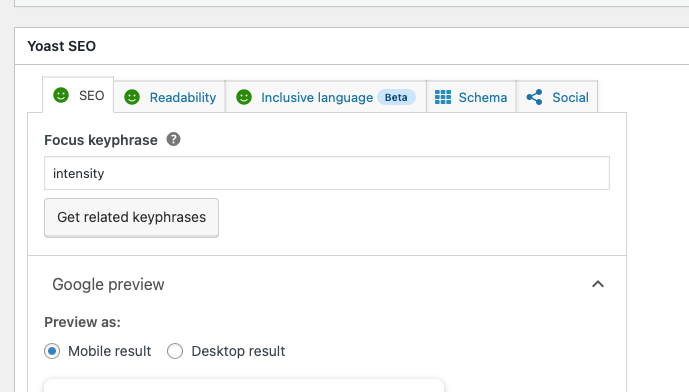Your cart is currently empty!

Yoast Adds Inclusive Language
Yoast SEO, a popular plugin for WordPress websites, is breaking ground with a new feature. The plugin already checked your website’s posts and pages for search engine optimization and readability. Now it will also check for inclusive language.
What’s inclusive language?
Inclusive language refers to words that don’t exclude anyone. For example, an article about whether men can get osteoporosis got this warning:
Yes, we are being warned not to refer to people as “men and women.” In the health care article we were analyzing, the use of “men and women” seemed entirely appropriate, but in some cases it might not be. “Both men and women can develop osteoporosis” seems acceptable to us, but we could have gone with “People of all genders can develop osteoporosis.”
There are probably clearer examples, but a diligent search in our websites did not find any. If you (or your website’s writers) are less aware of inclusive language, you might get a lot more warnings. Yoast gives the example of “firemen” rather than “firefighters.” The plugin will point out any words and phrases that threaten your post’s inclusive flavor.
Plenty of well-meaning people are unaware of potentially offensive language. I only recently learned that the phrase “grandfathered in” has racist roots and is offensive to savvy readers. My use of that phrase in earlier times was never intended to be disrespectful or inappropriate; I just didn’t know any better. That’s why it can be useful to have warnings about non-inclusive language use.
How to get the inclusive language checker
If you already have Yoast SEO installed, you can get the inclusive language checking feature for free with a couple of clicks.
First, make sure you have the current version of the plugin. Update if you need to. There is a brand new interface, so you may need to poke around a little to see where things are. Go to the Settings tab. You will see “Inclusive language analysis” illustrated in seafood green. Toggle it on.
A quick warning — if your website is not in English, the option will be grayed out. This feature is only available in English right now.
Why is this feature not automatically offered? A team member at Yoast told us that they are aware that there are people who would find it irritating to be told not to call people “men and women” and they want to leave the choice up to the user.
How to use the checker
Once you turn on the function, it will check all your posts and pages automatically. When you check SEO and readability, you will see Inclusive Language as an option as well.
Click on that tab and you will see any questionable words or phrases. You can then decide whether to change them or not.
Does inclusive language affect your SEO?
Yoast suggests that using non-inclusive language can cause visitors to behave in ways that can harm your fundability with Google. They also suggest using inclusive language, as we do, because it is the right thing to do.
A quick check reveals that a search for “firemen” is more likely to show sites that use the word “firemen” than sites that are consistent in their use of “firefighters.” If you have reason to believe that your target market prefers one word or phrase over another, using that specific word or phrase can make sense.
We had a discussion on this subject with a client who believe that the word “inclusivity” was “triggering” for their target market. We don’t think that people who object to this word look for the word. On the other hand, we saw a significant drop in performance for a website which switched from terms like “birth mother” to more currently acceptable terms, because the fact was that people looking for services for birth mothers use “birth mother,” not newer euphemisms.
If you have stronger evidence for any answer to this question, we’d like to hear about it. In the meantime, we don’t have a firm answer.
by
Tags:




Leave a Reply